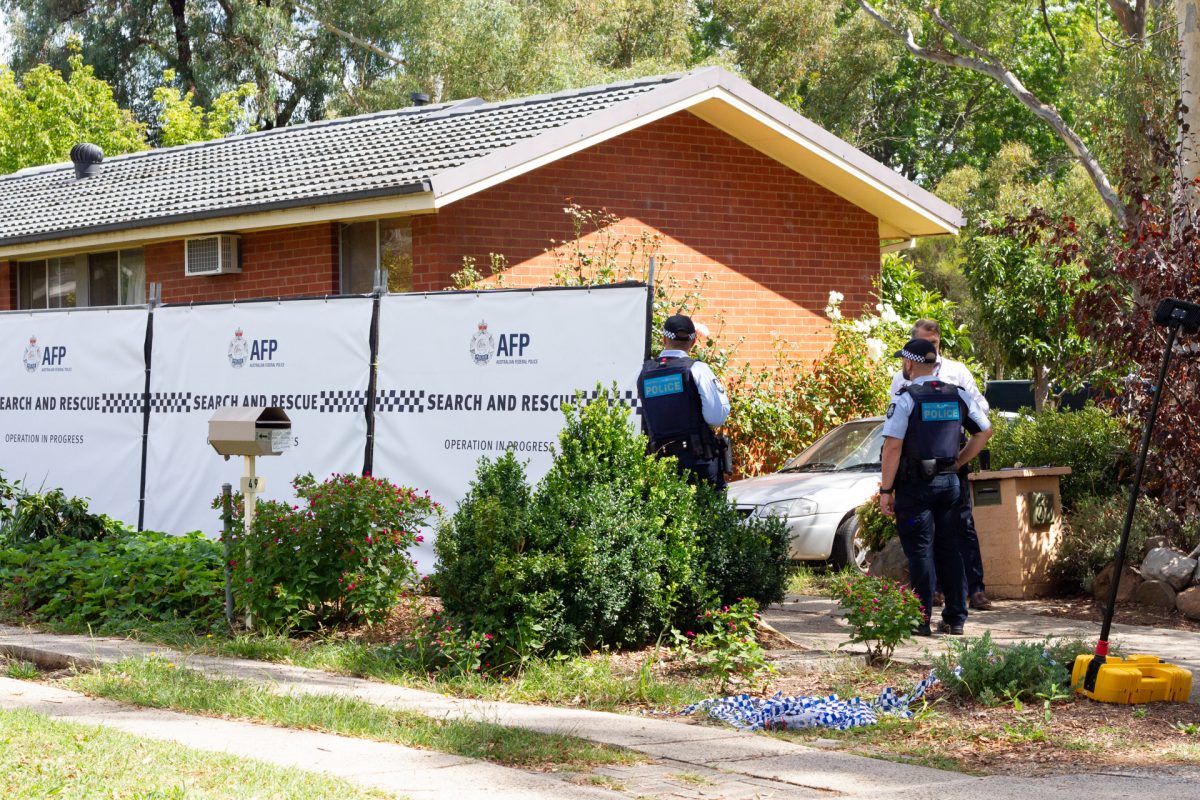
Police conducted a murder investigation at Braine Street, Page, in February 2021. Photo: Morgan McGoogan.
WARNING: This article contains graphic content.
A man who used a meat cleaver and a knife to kill his housemate and nearly kill two other people in a terrifying attack one of the survivors later described as “like a horror movie” has been found not guilty of his charges due to his mental health.
Wajid Kakar had been accused of murdering Michael Allen Clement Williams and attempting to murder two others on 20 February 2021 in the north Canberra suburb of Page.
However, while he committed the attacks, the 37-year-old was found not guilty by reason of mental impairment due to his schizophrenia, Justice Belinda Baker told the ACT Supreme Court on Thursday (31 August).
She did say if he had been found guilty, she would have sentenced him to 30 years’ jail.
Details of the terrifying attack were publicly revealed earlier this year.
Justice Baker said Kakar had moved into a share house in Page in late 2020, renting with Mr Williams and two other housemates who sometimes found him to be aggressive.
The day before the killing, Kakar stayed in his bedroom, playing loud music and making voice recordings. One of the housemates left the residence that evening, but a woman arrived and stayed over for a date with the other.
Shortly before 9 am on 20 February 2021, Kakar used a sharp object, most likely a meat cleaver, to inflict numerous wounds all over Mr Williams’ body.
His injuries included fractures to his skull and spine while his spinal cord was almost severed.
Meanwhile, the woman and the housemate woke up to Kakar barging into their bedroom, carrying the knives and saying something like, “I’m going to kill you”, before slashing and chopping them both.
The housemate was cut 44 times over his body before he was able to flee, then he ran from the house and asked a neighbour to call the police.
Kakar left the bedroom for a moment and the woman tried to hold the door shut to stop him returning. However, he forced his way back in, dragged the woman into the kitchen and continued to cut her all over her body with the meat cleaver, leaving her with fractures to her skull and spine.
He then used the knife to cut his own throat and stab himself in his abdomen. He walked outside with the weapons and saw a neighbour, then chased him out to the road before returning home.
Kakar also ran at police officers while carrying the knives when they arrived at the home, then he continued to get up and try to move towards them when they tasered him.
The woman was found in a pool of blood in the kitchen, while Mr Williams’ dead body was found in his room.
Justice Baker said the woman and the surviving housemate were taken to hospital in critical conditions and would not have lived without surgical intervention. They will have physical scars for the rest of their lives and will suffer from ongoing psychological trauma.
Kakar, who was a heavy user of cannabis and alcohol, was born in Afghanistan and said his wife and children were in Pakistan, but the justice said he had given differing accounts about his personal life, such as how many children he had as well as their ages and genders.
Also, he’d claimed the Taliban had killed his father but then told a doctor his parents both lived in Afghanistan.
He was granted a temporary protection visa in Australia but had his visa revoked and spent about four years in detention before being granted another.
He moved to Canberra in 2020 and worked as a labourer but was unemployed at the time of the attacks.
Justice Baker said four medical experts had the unanimous view that Kakar had a defence of not guilty by mental impairment.
She said she was satisfied the physical elements of the charges had been proved, but the experts were of the unanimous opinion that he has schizophrenia of such a nature that he could not control his conduct or appreciate that his conduct was wrong.
She ultimately accepted these opinions, but she did say unless his mental impairment could be treated, he presented a grave risk to the community.
She ordered that he be detained in custody for immediate review by the ACT Civil and Administrative Tribunal (ACAT) under the Mental Health Act.
She also set a nominated term of 30 years’ jail, expiring in 2051, the maximum time he will be detained. However, she said it was up to ACAT to determine how long he will remain in detention.













![Michael O'Connell found guilty of murdering 'love of [his] life', Danielle Jordan](https://the-riotact.com/wp-content/uploads/2023/06/michael-OConnell-facebook-october-2021-e1686613629499-360x189.jpg)






Lucas Anasdow 🤦♀️ Anyone else getting the idea that all these comments that ALL say… View